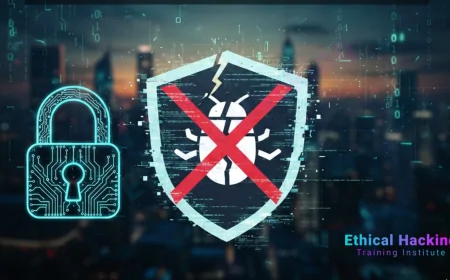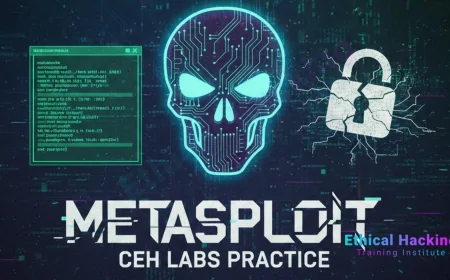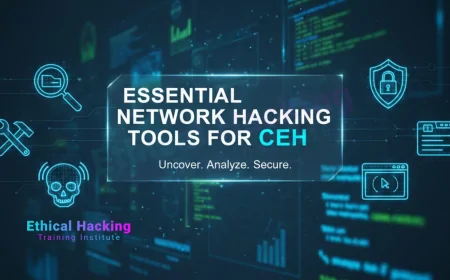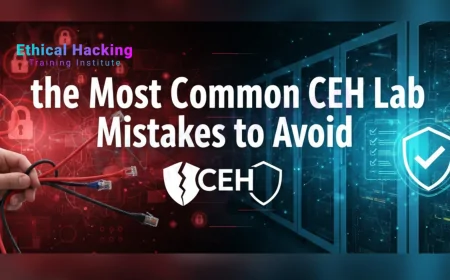CEH Ethical Hacking: What You Need to Know Before You Start | Starting CEH Ethical Hacking? Read This First
Learn everything about CEH ethical hacking before you begin—certification overview, training options, exam details, skills needed, and career insights.
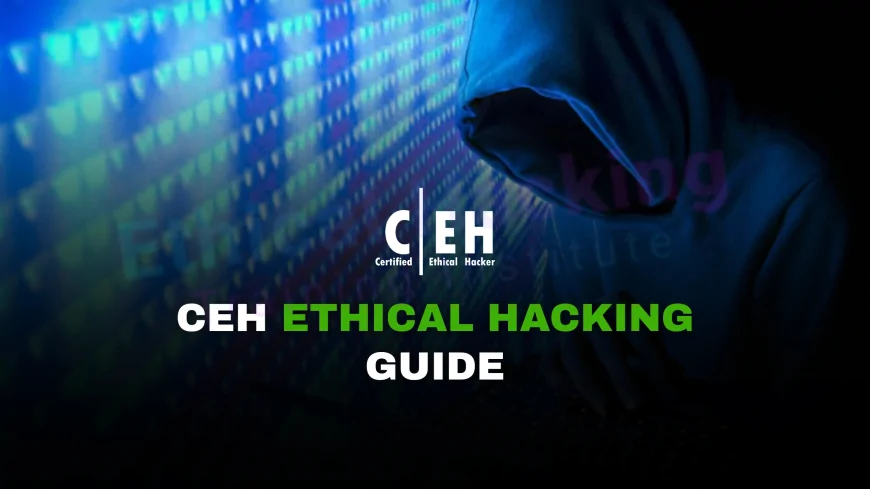
Table of Contents
- CEH Overview
- Why CEH Matters
- Core Skills You Need
- Eligibility Criteria
- Training and Learning Paths
- Exam Format & Content
- Study & Preparation Strategies
- Hands-On Lab Experience
- Career Opportunities Post-CEH
- Salary & Market Demand
- Common Challenges
- Maintaining Certification
- Top Resources
- Frequently Asked Questions
- Conclusion
CEH Overview
The Certified Ethical Hacker (CEH) is a globally recognized certification offered by the EC-Council that validates a professional’s ability to think and act like a malicious hacker—but for ethical and legal purposes. It teaches how to scan, test, hack, and secure systems against real-world cyber threats using the same tools and techniques employed by malicious actors.
Recognized globally, the CEH certification is a common requirement for careers in penetration testing, security analysis, and cyber defense. It covers critical topics including footprinting, scanning networks, malware analysis, web vulnerabilities, wireless security, and cloud attack vectors.Whether you’re an IT professional or a cybersecurity enthusiast, CEH offers a structured, hands-on approach to learning ethical hacking.
Why CEH Matters
In today’s digital landscape, cyberattacks are more frequent, sophisticated, and damaging than ever before. Certified Ethical Hackers are trained to simulate cyberattacks and uncover weaknesses in systems, helping organizations proactively defend against real threats.
With global recognition, CEH opens career opportunities in ethical hacking and cyber defense, including roles like penetration testing and vulnerability management. It's often a requirement for government and defense-related jobs under frameworks like DoD 8570. The certification is recognized by hiring managers and recruiters worldwide as proof of hands-on offensive security skills.
Whether you're entering the cybersecurity field or aiming to level up your existing skills, CEH offers a strong foundation in ethical hacking techniques, making it one of the most valuable certifications in the industry.
Core Skills You Need
- Networking basics (TCP/IP, routing)
- Familiarity with Linux and Windows
- Basic scripting (Python, Bash, PowerShell)
- Understanding of web technologies (HTTP, HTML, JavaScript)
- Tool knowledge: Nmap, Burp Suite, Metasploit, Wireshark
- Analytical thinking and problem-solving mindset
Eligibility Criteria
To sit for the Certified Ethical Hacker (CEH) exam, candidates must meet certain eligibility requirements set by the EC-Council. There are two main paths:
- Path 1 – Official Training: No prior experience required if you enroll in an EC-Council Accredited Training Center (ATC), online via EC-Council iClass, or through an academic institution. This path automatically qualifies you to take the exam.
- Path 2 – Self-Study: If you choose not to take official training, you must submit an application showing at least two years of documented work experience in the information security domain. Candidates opting for self-study must pay a $100 non-refundable eligibility fee to EC-Council.
Applicants under both paths must agree to EC-Council’s Code of Ethics and provide legal documentation if requested. It’s important to ensure your background aligns with the ethical principles required to become a certified professional in this field.
Training and Learning Paths
You can choose from:
- Official EC-Council iClass: Live or self-paced courses with iLabs
- Accredited Training Centers: Classroom or blended modes WebAsha Pune
- Self-directed labs: TryHackMe, Hack The Box, OverTheWire
Exam Format & Content
The CEH exam features 125 multiple-choice questions, to be completed in 4 hours. Topics include:
- System hacking
- Malware threats
- Web-based attacks (SQLi, XSS, CSRF)
- Cryptography
- Cloud and IoT security
Passing scores vary depending on exam difficulty (60–85%).
Study & Preparation Strategies
- Create a detailed study plan with weekly goals
- Pair each theory topic with a lab exercise
- Use official study guides and practice exams (Boson, EC-Council)
- Study in peer groups or join CEH forums
- Stay current: follow threat feeds and cybersecurity news
Hands-On Lab Experience
Practical labs are essential. EC-Council’s iLabs offer official hands-on exercises. Third-party platforms like TryHackMe, Hack The Box, and WebAsha Labs provide controlled, legal simulations of real-world systems. OverTheWire helps with foundational skills. PortSwigger Academy teaches web hacking using Burp Suite.
Career Opportunities Post-CEH
- Penetration Tester
- Security Analyst
- Incident Response Specialist
- Red Team Operator
- Security Consultant
CEH is often a prerequisite for government positions and roles requiring compliance adherence like DoD 8570.
Salary & Market Demand
CEH-certified professionals earn competitive salaries globally. In India, salaries range from ₹6–25 LPA depending on experience; in the USA, from $75,000 to $135,000 annually. Demand remains high as every sector strengthens cybersecurity defenses.
Common Challenges
- Balancing theory and lab practice
- Keeping up with rapidly changing attack techniques
- Managing exam time under pressure
- Meeting eligibility requirements
Maintaining Certification
CEH is valid for three years. To remain certified you must earn 120 Continuing Education Credits (ECEs). Activities include attending events, completing training, writing articles or developing tools, mentoring, or participating in labs. EC-Council also charges an annual maintenance fee (approx. $80). Failing to renew loses certification status and may incur reinstatement fees.
Top Resources
- *CEH All-In-One* by Matt Walker
- *Official CEH Study Guide*
- ACE labs: TryHackMe, HTB, iLabs
- Websites/blogs: OWASP, Krebs on Security, MITRE
- Communities: /r/CEH, InfoSec Discord, CEH study groups
- Podcasts: Darknet Diaries, Smashing Security
Frequently Asked Questions (FAQs)
1. What is CEH?
Certified Ethical Hacker is a credential validating your hacking skills legally for cybersecurity purposes.
2. Is CEH hard to pass?
With proper study plans and labs, CEH is achievable—expect 60–85% score depending on exam version.
3. How long will preparation take?
Most learners take 8–12 weeks of focused study and hands-on practice.
4. Do I need previous experience?
No, if you opt for official training; but self-study requires at least 2 years InfoSec experience.
5. Can CEH help with bug bounty?
Yes, it gives foundational knowledge for recognizing vulnerabilities in web and applications.
6. Is scripting mandatory?
Not mandatory, but Python and Bash skills help automate and understand tools.
7. Does CEH include cloud security?
Yes—CEH v13 includes cloud and container vulnerability modules.
8. Can I take the exam online?
Yes, remote proctoring via PearsonVue or EC-Council exams portal is available.
9. How do I maintain the certification?
Earn 120 ECE credits in 3 years and pay annual renewal fees.
10. What’s better: CEH or OSCP?
CEH offers broad theory; OSCP offers deep technical hands-on practice. They complement each other.
11. Are there official labs?
Yes, EC-Council offers iLabs; many training providers offer integrated lab platforms.
12. Does CEH require recertification exams?
No extra exam—just education credits and fees.
13. What jobs can I get with CEH?
Pen Tester, Security Analyst, Incident Responder, Security Consultant.
14. Is CEH globally recognized?
Yes—recognized by governments, enterprises, and international firms.
15. Can students enroll?
Yes, with training or two-year InfoSec experience.
16. How much does CEH cost?
Around $1,199 for exam voucher; training costs vary widely.
17. Can CEH lead to higher certifications?
Yes—like CEH (Practical), CPENT, OSCP, CISSP.
18. Do they teach web hacking?
Yes—modules cover SQLi, XSS, CSRF, and related tools.
19. What's CEH (Practical)?
An add-on practical exam where you hack machines in a live environment.
20. How can I track study progress?
Create logs of labs completed, mock exam scores, topics covered, and skills acquired.
Starting your CEH journey is an exciting step toward a rewarding cybersecurity career. Success requires theoretical knowledge, practical labs, a structured study plan, and active engagement with the cyber community. With dedication and the right support, you’ll not only pass the exam but also build a strong skill foundation for future roles and certifications.
Conclusion
What's Your Reaction?
 Like
0
Like
0
 Dislike
0
Dislike
0
 Love
0
Love
0
 Funny
0
Funny
0
 Angry
0
Angry
0
 Sad
0
Sad
0
 Wow
0
Wow
0
